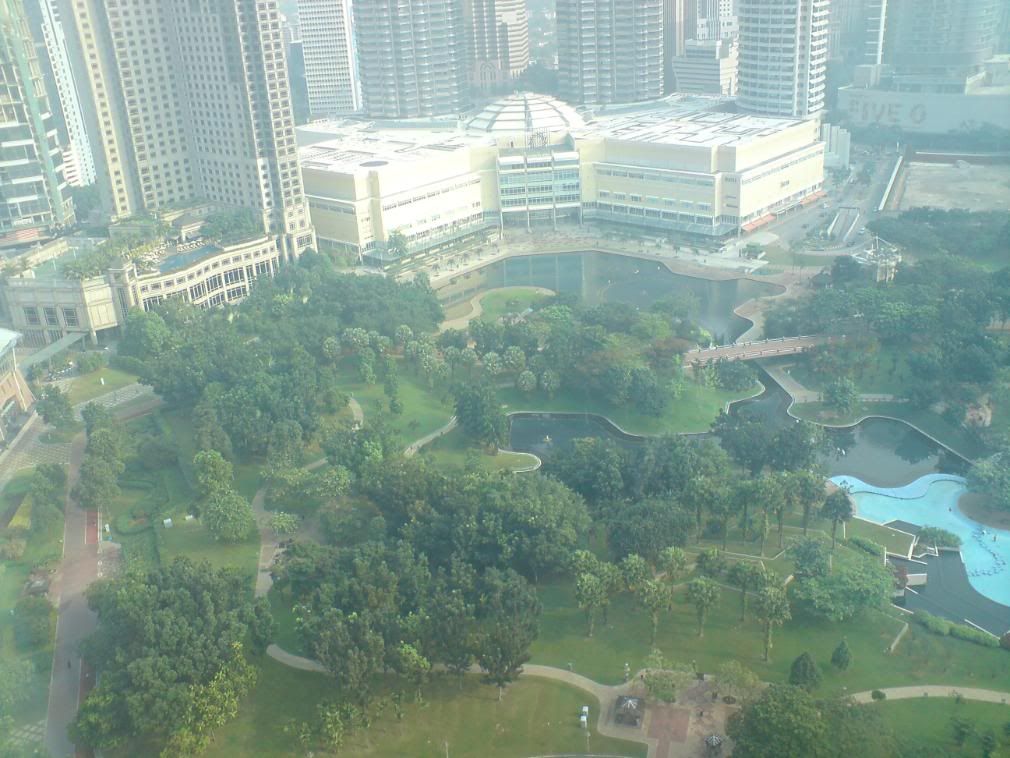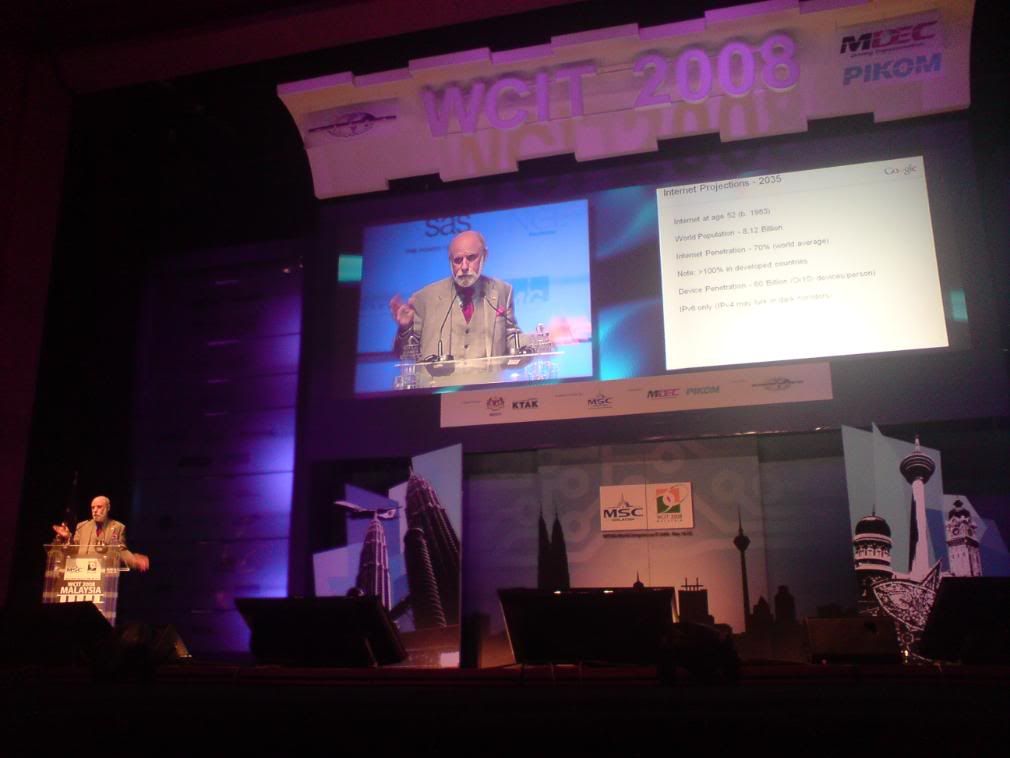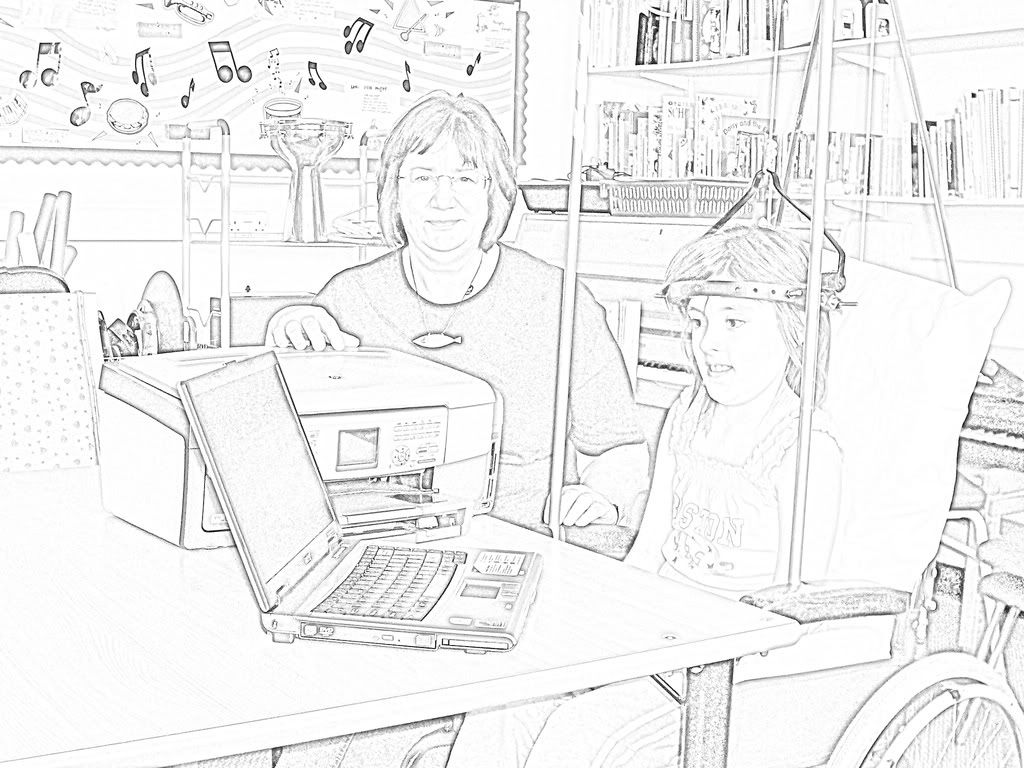I had the honour of attending and speaking at the WCIT 2008 conference in Malaysia and here are some rather disjointed notes that I had while listening to the speakers. I tried to clean it up, but again, apologies for not being able to make this very professional indeed.
Monday
The conference center is big!  And I got lost in the exhibition hall. Quite an impressive setup. So then finally managed to extricate myself from poking into the guts of various exciting electronics bits, went looking to find the plenary hall, and found myself sitting in the hall looking at an ant hill of activity. I could not imagine how on earth will they manage to fit 3200 people and assorted volunteers and managers into this hall but they sure did.
And I got lost in the exhibition hall. Quite an impressive setup. So then finally managed to extricate myself from poking into the guts of various exciting electronics bits, went looking to find the plenary hall, and found myself sitting in the hall looking at an ant hill of activity. I could not imagine how on earth will they manage to fit 3200 people and assorted volunteers and managers into this hall but they sure did.
Typically, there was the media scrum when a Prime Minister arrives....We were welcomed by 40 children welcoming us in 40 languages representing 90 odd countries here, but the language used through out the conference is English. Curious, no? the prevalence of English in the world?
He also said that UK and South Korea are behind Malaysia in the World Competitiveness Index, and I can well believe it. Although checking the Global Competitiveness Report here seems like the results are different. Perhaps he is talking about this report. Anyway, mere quibbling. And now the PM has left and literally the front 1/4th of the hall has emptied! Some more speeches about WITSA.
Then Dr. Craig Bennett, Chairman of Intel, started talking about how we have a billion people on the Internet and now we have to get the next billion on the Internet as well. He said that four factors are important for knowledge based economic development
- Physical access to technology
- connection to internet and connectivity
- content targeted at local population
- education on how to use the tool
He said that a well educated teacher is the magic and not the PC in the classroom. He showed a video about a Nigerian school which has embraced technology but said technology again is not really the only answer.
He talked about taking a holistic viewpoint, what's the point of giving a $200 PC while the monthly connectivity costs are $250 per month in many countries, 100kb monthly cost in Japan is 6 cents, 50 cents in USA and more than 80 dollars in Sub-Saharan Africa. Now you can get an idea how tough it will be to get these people on the intranet or to roll out the broadband revolution to them (more about the exception being that of India later on).
He talked about how Pakistan is being used as an example of pushing broadband and network connectivity out into the sticks. 60mm dollars is the budget, rolling out in untouched areas in Pakistan, he invited a Pakistani chap to the stage who is the CEO of the public company which is helping to push this (didn't catch the name). Connectivity is a challenge. Satellite is way too expensive. Fiber is the only way. Rolling out fiber is tough, so tehsils where its not remunerative for private companies, this company gives money and offers seed capital, it helps to improve the business case for the private firm. This was a good step. The Pakistani chap said that Govt should not be involved that much in this business, put power to public private consortiums or just private firms, give them a stake in the business and then it will work. But I am not holding my breath, I want to know whether connectivity actually helps or would more investment in say better teacher training help?
He video conferenced a doctor from Brazil into us, how location differences for patients versus diagnostics versus doctors versus care had disappeared, and this tele-medicine actually is helping far more people than medicine and doctors were previously. Then there was some corporate stuff with some kids brought on stage and it ended. It was a bit too slick and the questions with the kids was too obvious and that left a bit of a bad taste in my mouth. Such a senior chap shouldn't need such kind of gimmicks to play around with such an important topic, we are all adults, you don't have to take us to be children or idiots to play that game.
I was a bit impressed with what he had to say, but what he had to say was crucial (leave aside all the silly posturing and even more silly marketing of Intel stuff). His point was, throwing money at technology and expecting better performance from students was wrong, the idea is to teach the teachers to be better, that will provide better results than thousands of PC's and laptops.
Nothing much to note for the next few sessions. The post lunch session for the Ministerial panel was a bit interesting. Mainly because you could see how various governments approached this entire idea of information technology. You know what was the most disappointing? It was the Philippines MP. She came across as a complete Neanderthal, saying that in many parts of her constituency, there is no electricity power anyway, forget about PC's, and it was a whine. The Philippines government should really have thought that through. The Malaysian government minister and other ministers were smart, they obviously were pushing their countries and with due reason, telling us, the corporate folks, what we wanted to hear..., but Philippines? Pathetic. She is a blot on that country's face.
The next wireless broadband session made me go to sleep. Pure and simple, those two Rumanian scientists, bright as they were, made me doze off specially when they started talking about antenna design, and specially after that excellent lunch.
Woke up to an excellent presentation by Professor Takenaka. He talked about how he was made the Minister for Finance in Japan by a certain Lionheart PM of Japan. Fascinating tale of how he took on the entrenched might of bureaucrats and financial institutions and won. And I well believe him, given some down sides, generally that time was brilliant, it still shows that even in a consensual driven society such as Japan, you can still have mavericks who hire mavericks who really make a huge difference! Brilliant fellow. Unfortunately he was not allowed to fulfill his destiny and do all that he wanted to do but there you go, he literally broke the back of the Japanese economic stalemate. I was personally quite impressed but I suspect that quite a lot were not as he was talking more about economics and finance than IT. The IT piece came way afterwards, a little bit and as an after thought.
Then we had Bill Gates in a hologram talking about Microsoft and then Dr. Zhang also, not very clear about what, was flagging badly by that time.... and then we went off back to the hotel, did some more emails and then some calls back home and then off to dinner, again, dinner was brilliant, and pigged out and came back and went to snore, i mean sleep.
Tuesday
The day started with perhaps one of the most interesting panel discussions I have ever attended. It was to do with how to produce innovation and creativity and what can be done to enhance it. These were the people there.
- - Arnold Gay, Anchor, CNBC - Moderator
- - Kamil Othman, Vice President, Multimedia Development Corporation
- - Fritz Attaway, Executive Vice President, Motion Picture Association of America
- - Terry Thoren, Chief Executive Officer, Rocket Fish Studios
You cannot get a better collection of people talking about the most creative of industries, motion pictures and a very educational and interesting debate happened. Terry said that the world is changing, Malaysia has twin towers now while USA no longer has it. Who knows what's going to happen in the future? He has severe distaste for politics but great admiration for tech, people, process, creativity, etc
Kamil went into deep details on how to build an innovative industry? Animation in Malaysia. Disappointing take up, long way to go, to make a Walt Disney, you need to start with one million children drawing in grade 8. You cannot create a flash laboratory, shove people in there and wait on the other side of the Lab waiting for Toy Story or Cinderella to drop out of the other side. It has to be started from the very basic levels, people cannot look down on the arts which they do at this moment.
Monetisation of opportunities and content is a challenge, how do you do it? look around you, all countries are pushing people to get educated and into the knowledge sciences, but not all people are thus inclined. Many people simply do not like mathematics or technology. Some people want to study arts, or paint or simply do not have the mathematical skills. What do you do to them? Those who want to write poems? How does he get paid? or fed?
There were conversations around how to create a movie or animated film, quite interesting to see how Hollywood and Silicon Valley literally took decades to develop, you cannot do that just by throwing technology at it. Quite thought provoking indeed. Perhaps one could question whether it is possible to force people to become creative? Or can you just provide the infrastructure and let them get on with it? or is it just let people be, and trust in them to come up with the goods?
---------------------
The next session had more ministers but I was quite interested and taken by A Raja, Minister of Communications and Information Technology, India. I have to admit, I was quite cynical at first knowing about Indian politicians, but was very impressed to see what he had to say about it all, how they are powering ahead with the licence's, what mistakes they made, how the process of governance is happening, who gets to approve what? and so on and so forth. Pretty good and well, I will think that what he is saying is right, because I have experienced the mobile phone revolution in India.
As usual, it has to be different. Rest of the world goes through scientific revolution, industrial revolution, then wars then dial up then broadband and mobile, India starts off with revolutions in 3000 years BC, then has fun, then goes into decline, then starts off with a revolution in Y2K and then the next revolution is mobile and mobile internet and mobile commerce is bigger now, how strange and unique... Very curious, loads to think about there. The technology trajectories of these two countries, based upon what Dr. Jiren of China said, are so different. One wonders what will happen in the future.
Incidentally, there was a gentleman from Saudi Arabia who made me think of the previous session. He spoke on about how much money has been pumped into the industry in Saudi Arabia, the emergence of knowledge cities, and the like. Not impressed at all. Not at all impressed. Setting up a knowledge city and throwing money at it does not solve the problem of creativity or having knowledge industries. For that, you need to have creativity at the school level. They have to inquire and challenge everything. Can you imagine something like that happening in Saudi Arabia? Which is the reason why I couldn't take it any more and went outside to grab a coffee. Perhaps the organisers should have kept coffee on tap, this was crazy, they dont want the participants to keep awake? dont they know we drink coffee by the gallon?
------------------
The next topic was rather dry, Dr. Mobius talked about where the next hotspots will be. And I lost my notes on this lecture so this part is a bit vague. I remember him showing loads of graphs about where and when returns are made. It was an asset management view, so was a bit dry. Still, was a bit interesting, specially around the returns of the various sectors in the Asian economy. That is much that I remember... if and when I get my hands on his slide deck, and have time to read it again, will comment...
--------------
For the next session, I went to the "Asia, the destination of choice for Shared Services and Outsourcing" session.
- - Dato’ Narayanan Kanan, Senior Vice-President, Multimedia Development Corporation – Moderator
- - Michael F. Corbett, Chairman of the International Association of Outsourcing Professionals
- - Dr Ganesh Natarajan, Chairman, NASSCOM
- - David Wong, Chairman, Outsourcing Malaysia
- - Stephen Braim, Vice President Governmental Programs, IBM Asia Pacific
Very interesting, Michael spoke about the impact of the US elections on international outsourcing. I was, frankly a bit puzzled by that kind of emphasis. For two reasons. The first aspect is that the actual number of jobs which are dependent upon the classical aspect of outsourcing is reducing, and the second aspect is, did he really think that the elections will make a tiny bit of difference? Obviously yes, but I am rather disappointed that it was more American rather than International. Also, I was a bit saddened that there was no discussions about international aspects, taxation, technology which allows remote working, etc.
But overall, it was quite interesting, there was discussion about education and how that will help in various countries. What Malaysia is trying to do. What the IBM view was from the perspective of government initiatives and education and so on and so forth. But also, I was a bit disappointed that most people's perspective was the next 8 - 12 months, not more. Still, lets go to lunch, was feeling quite hungry now.
-----------
Over lunch, we had a speech by Dr. Rowe, where he was talking about how the worlds of virtual reality and real life reality meet and how they work together. Quite an interesting topic and he spoke quite a lot about his own personal experiences and the like. But not much about real life applications. I then sent him an email afterwards, and this is what I said to him.
- At ABN AMRO, we used Second Life to actually recruit, it was very challenging and interesting but it ultimately failed because of lack of regulatory frameworks. Ended up with 5.5 FTE dedicated to Second Life but then scaled back.
- We also used a virtual world to help mentoring. Such as when we have just 2 IT employees in Uzbekistan, then how do I get the junior chap mentored? So we setup a virtual world where mentors and mentee's can congregate in a persistent state across the world. This helps in knowledge capture and better employee retention.
- My friend from BP is using a virtual world to track every employee in complex and potentially dangerous plants. This location tracking and graphical display of every employee is used for fire, safety, evacuation and training purposes.
Second life and other virtual lives have become really challenging world and are throwing up some seriously challenging questions for us, again which have not been fully explored just yet.
--------------
Unfortunately, I missed the next slot because we had to go and get powdered up for our session at 3. Not much to speak about in there, check out the slide deck. Also managed to miss out a large proportion of the next presentation from Dr. Pachauri because we were supposed to be in a room answering questions. But did manage to catch snippets of his talk. Quite interesting.
I had to take an office phone call so managed to miss out on the next one as well. So that was that. Nice dinner, watched a charity auction, observed some very nice and lovely looking ladies. This lady was standing 2 feet away from me. Very fragrant. Nice hair even.
Wednesday
This day was going to be challenging, specially since it was also the Champions League Final day.
The day started with me taking breakfast in the Trader Hotel Lounge, where I had been put up, its just next door to the KLCC so very convenient indeed. So took some pictures from the 34th floor lounge while having breakfast.



Here are the twin towers, at the base you can see the gigantic 6 story mall with two wings. It is absolutely stonkingly huge, that mall. Anyway, the twin towers, and the very well landscaped park around the buildings. The building on the left of the twin towers is the Mandarin Oriental where many other guests were also put up.


Then the day started with two debates on the future of the Internet. A deep discussion erupted over the net neutrality issue. To be honest, I have never really thought about it till I was forced to sit and listen to these two debates. Not that I have really firmed up my thoughts but the question is, who pays for the internet? It is my firm belief that nothing is free in this world, somebody will ultimately pay, either the taxpayer, stockholder, consumer, today you or tomorrow in the form of your child. Somebody has to pay. So this idea that the net is free is frankly stupid and more worryingly, it shows a childish view of the world.
Also, the idea that a communications network will or should be free is against human history. Do you think that the pigeon post was free to everybody? or the pony express allowed everybody to send stuff over? or how about the fact that letters still cost to send stuff to each other? Or the fact that we have public and private ownership over the postal system? Or the fact that we have regulations governing what can and cannot be sent over the posts? Or how about the fact that online classifieds are killing newspapers? Or how about the issue that emails are killing the postal system? So when we do not have any issues over that, why do we suddenly end up having an issue over the net neutrality aspect? Here is a good overview article. Very complicated matter, but I suspect it will end up like we have the health service. A Universal service provision which will provide some kind of a basic internet, which is slow and unreliable, while a paid for internet which is better and faster. Pretty much common compared to other industries, if you ask me.
Then there was a discussion about Silicon Valley, it started in 1940's, it took 10 years to know, 10 years to come, 20 years to investment, etc. etc. Takes a heck of a long time to start developing an industry. See what Taiwan did, took them decades to get to it but get to it they did. Now they are the champions, and almost every PC in the world has some Taiwanese components in it.
============
Next session I had to miss, then popped into the Mexico session for a few just to realise that they were talking about near shoring. I mean, d'oh, get on with the programme, people are now in the 5th generation of out sourcing and we are still in the terminology of the 1st generation. Crikey! that made me so depressed that I went back to the room and started my calls. Also had a quick bite to eat in the room itself, couldn't’get out of the calls but went back to catch the next great debate.
----------
Not much to report on other than the fact that one of the guests (I told you, lost all my notes because my stupid My Documents folder decided that it wants to forget all about my previous history and start afresh to synch...). said that the adoption of energy efficiency standards by California means that the energy usage per citizen has now leveled off compared to other states. But if you think about it, the lesson from this is to start imposing energy standards more and more, get people challenged to be smarter about their energy usage. So while the usage will rise, but it will level off at some point!, interesting, no?

So I went looking for some data. What does this tell you? Well, it did make me go hmmmm. We are actually seeing a dip in the energy consumption per capita in North and South America, albeit from a relatively high level. Delving deeper into North America, Canada and Mexico are showing an increase while, very surprisingly, USA is dipping down and decreasing. How curious. 40 countries out of 134 countries actually showed a dip in energy consumption between 2000 and 2003. Some of them were obviously banana republics which were facing economic downturns such as Zimbabwe, or contractions such as Argentina, Ivory Coast, Bolivia, Eritrea, etc.
But what explains this reduction for countries as varied as Belgium, Brazil, Australia, Chile, Japan, New Zealand, Singapore, UAE, United Kingdom and USA? Can it be that despite increasing populations, their energy efficiency is improving? Dont take my word for it, check out the data. It is from the IEA even, so would be ok as well. Population information from the United Nations.
The next topic was the most interesting one, so I will put up another dedicated post for it. Came out to grab a coffee before going back in and saw that the sky was cloudy, the KL Tower was nearly hidden under clouds. Unfortunately, all the photographs with the top of the tower hidden did not come out, but hope you can make out the onion dome in the back being hazy in the mist.

One of the living legends of the internet age, Dr Vinton Cerf, Vice-president & Chief Internet Evangelists, Google, spoke on the topic of "Tracking the Internet into the 21st Century". This was the final presentation of the WCIT and the entire hall was absolutely crowded, people were standing on the aisles waiting to hear that great man.

He talked about the future of the internet. Said that the internet penetration around the world is strange. Asia, Middle East and Africa are bad or low or both. Only 20% of the world is connected. He used the World Population Reports from the UN about the 2300 figures and displayed them, some interesting rises and dips. I presume he is talking about this report. See the graph on page 19 of the report. High scenario shows a horrifying 36 billion people on the planet, with a medium one of less than 10 billion. Bloody interesting report but this is not the place to go into it.
He talked about how only 20% are connected to the internet and more will grow. Incidentally, I found it much easier to observe him up on the main screen rather than watch him on the far left. Which begs the question, if this was webcast, then I wouldn't have traveled to Malaysia.... (theoretical question...). Which made me go off into a different train of thought.
My facebook, orkut, myspace, etc. accounts are nothing but very primitive clones of myself. I cannot be everywhere, so my primitive clones operate on my behalf. Just like my email system does and my voicemail system does. As a matter of fact, my home is also a sort of a clone. It has an address which is independent of me. People can communicate with me on an asynchronous basis and I can get back to them whenever. So when people are writing something on my facebook wall, are they communicating with me? or with my clone?
Say I have an active Second Life account. Is that me or is that my clone? Or both? I feed those clones with information and they act/react based upon my preferences. So I can be in another place via my robot/clone and get back information to me when it is convenient to me. I do not have to be face to face with you to get information. You can email/voicemail me and I can pick it up at my convenience.
If I communicate with my son online in Second Life via both our avatars while we are both across the world, am I still his father? to what extent? How about love? Can I show my love to him? via that medium? How does he know that it is me? Or if I was seeing Dr. Cerf across the world on a webcast, how would I know it is him? Just because somebody said so? identity problems galore. Does this mean that more friends you have, more your identify is confirmed? Like an amazon or ebay seller, more positive recommendations, the better is the identity and better is the trust. What do I do when I am dealing with a financial institution? Curiously, microcredit or microfinance rests on this premise, it lends money to people on the basis of guarantors from their community. So a person has to be social and know people and be trusted by them in order to get money. Bit different from my neural network Kohonen map based credit scoring model, eh? But I digress.
He talked about IPv6 (a network address for every device on this planet and then some, even some for your socks..), better search engines. He said something that I will come back to, he said that the monetisation and earning potential online will be less and the current business models will have to change.
He also talked about BIT rot, how on earth will you manage to open a Powerpoint 1997 file in Windows 3000? Forget about that old a problem, here is my problem. I wanted to dig out some research that I had done way back in 1990. I did not have the files here in London so had to wait till I got back to home and went to poked through my old cupboard. Besides the nostalgic kick, I finally found the floppy disks. 5 1/4 inch floppy disks to be precise. I have also operated the 8 inch floppy disk but well, the data that I had was in two formats, Lotus 1-2-3 and dbase. I remember sitting back on my haunches, looking at the dusty pile of floppies, and thinking back to those hours and days that I spent in typing in the financial data of the companies and did the basic analysis. Do you know, I even managed to calculate multiple regression on the damn things in there? Anyway, for all purposes, that data is now lost to me. I do not have a floppy drive anywhere near me, none of the 4 home pc's have it. I have an old laptop which has a floppy drive but it is 8 1/2 inch drive, not the older 5 1/4th inch drive. So I am stiffed.
Fast forward today. Financial institutions are supposed to keep data for up to 10 years. So your transactions and your records are supposed to be kept nicely and carefully within the firm for 10 years. Now the transactions are processed, on an average, via 10 odd applications. There can be many more depending upon the country and product but just think about it, 10 applications, multiple operating systems, multiple upgrades, multiple hardware requirements, multiple network systems, multiple servers, so many different types of technology stacks, and we have to maintain a record of this. Within 5 years, it becomes a major issue to keep up to date with technology, we are talking about 100's of years? No bloody way.
Museums are now struggling with electronic art. I could have taken those disks to a museum but they are also facing problems. Here's a great paper written in 2001 and the problem has become even worse now.
He also talked about the inter-planetary internet. That just blew my mind away but it needs much more thought before I can write more about it, its not fully comprehended yet. Anyway, he got a standing ovation at the end. I ran to attend his Q&A after getting distracted by an email, but still managed to get to the hall to ask him a question. I asked him, you have talked so much about what will happen in 2035 and 2300, the physical shape of the internet, the devices, the penetration rates, and and and. What do you think would be the value system, the monetary framework, the price formation or who will pay for it all? It was obvious that I had asked a wrong question immediately because it did not go anywhere fast. I did ask some follow up questions, but he is a great man, he had to rush off to meet somebody else.
This is my problem. I am supposed to think about what's going to happen in 5 years time in the financial world. This is what I am seeing currently. People who are in the 15-25 years of age category, the great unwashed herd who will be our future employees and customers, are not that well versed in value creation online. And why would they be? Look at what kids do online these days. He watches movies, plays songs, plays games, chats with people, participates in joint coding, and so on and so forth. Almost all of this is free or stolen. His email is free, his programming language is free, songs and movies are free, his video is from YouTube, his chatting is free via text and messenger, his voice is free over VoIP. So all these assets that these kids are using, they are all free at this moment.
So I am most certainly not surprised that they do not know the value of online assets. So when you ask them, how much are you worth? or how much will you work for? or how much do you wish to charge for your ideas? or how much funding will you need for your great online idea? no idea. And that is the issue that I am struggling with. In 5 or 10 years, the link between physical work, money and online assets will be inextricably broken. So how much would I pay a coder? How much would Microsoft pay a programmer when most online assets are free?
My son said something to me today that completely blew me away. He said that he will go create some online jewels and armour in World of Warcraft as birthday gifts for his friend who lives 5 houses down. No money, no nothing, just pure and simple virtual asset formation, entertainment and happiness increased but with no reference to money at all. Deeply worrying.
So to go back to Dr. Cerf, on what basis will anybody pay for a book in 2300? or a share in the company making Windows 3000? or the ability to write code? Or to create a powerpoint presentation? I do not have an answer, but I didn't get one either. I will be struggling with this as part of my job as well, but I am seriously not sure what the answer is. We saw some amazing valuation modeling during the internet boom. But they did put a value on an intangible asset, no? It was a bad value, but a value none the less. Also goes to the heart of what Mark to Market is all about. If this is all too philosophical, think about this, my son is happier getting a World of Warcraft spell rather than an intricately carved wooden box which I got for him.....Should I have gone to the local electronic fair in Kuala Lumpur and bought a user-id/password for him instead? How would I judge what is a fair amount to pay? I have no idea whatsoever. No reference points at all.
That brought me to the end of the conference. The last day, Thursday, was a trip to Cyberjaya and Putrajaya, the IT and administrative hubs of the country, but dont think that fits in here, so you can see some pictures here. I have also written another essay on my observations on Malaysia and that should be published soon as well. End of the day, fascinating indeed and perhaps it was appropriate that that brought my professional career stint with technology to an end, now its moving back into the front office. But technology will remain with me, either with my shareholder, customer or employees. Food for thought, will try to attend the next one in 2010 in Amsterdam.

 And I got lost in the exhibition hall. Quite an impressive setup. So then finally managed to extricate myself from poking into the guts of various exciting electronics bits, went looking to find the plenary hall, and found myself sitting in the hall looking at an ant hill of activity. I could not imagine how on earth will they manage to fit 3200 people and assorted volunteers and managers into this hall but they sure did.
And I got lost in the exhibition hall. Quite an impressive setup. So then finally managed to extricate myself from poking into the guts of various exciting electronics bits, went looking to find the plenary hall, and found myself sitting in the hall looking at an ant hill of activity. I could not imagine how on earth will they manage to fit 3200 people and assorted volunteers and managers into this hall but they sure did. 






